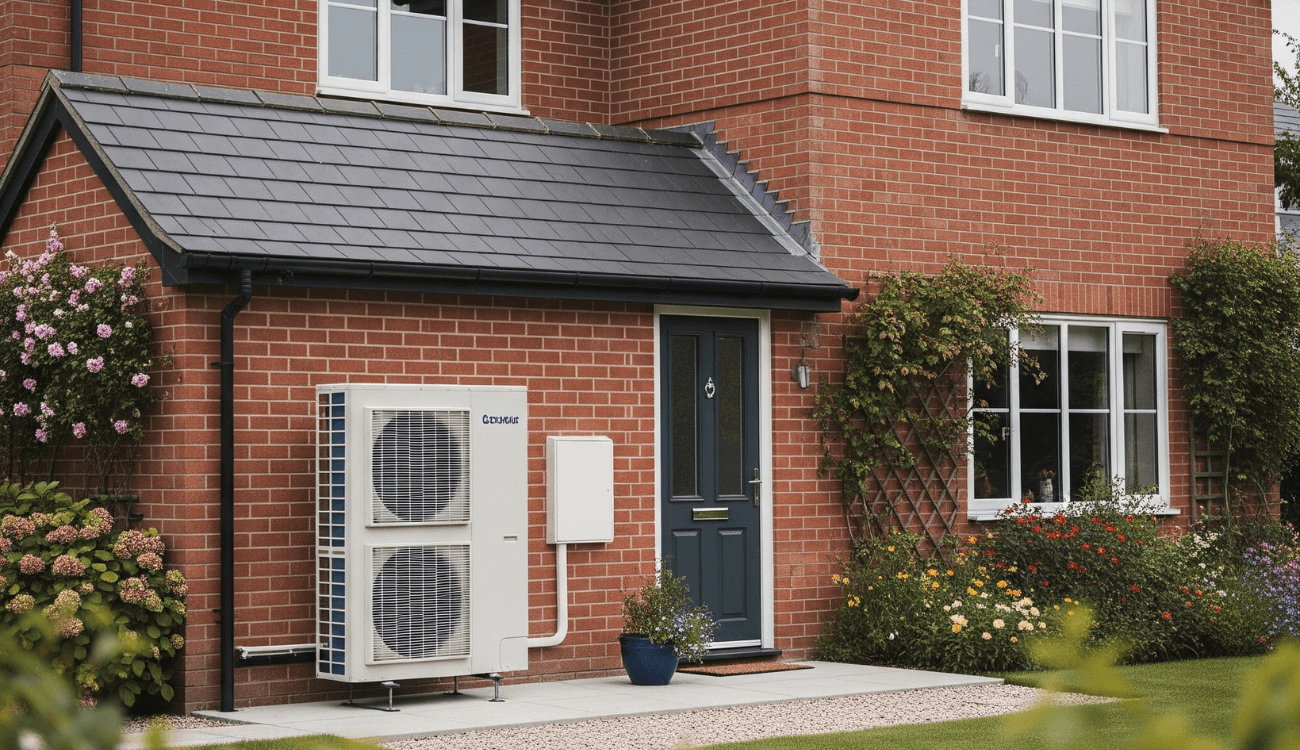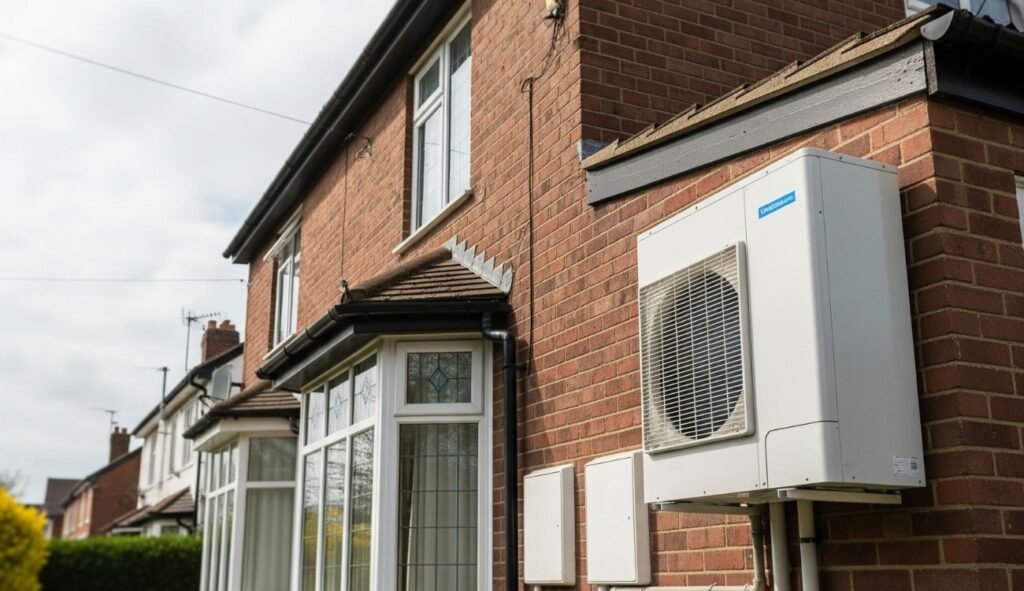Understanding heat pump running costs is crucial if you’re a UK homeowner, landlord, or commercial property manager considering an air source heat pump (ASHP).
With rising energy prices and a national push toward net zero, knowing what you’ll pay to run a heat pump versus traditional heating systems can help you make an informed investment.
This guide breaks down the real-world costs of running an air source heat pump, compares them to gas boilers, and details ongoing maintenance expenses.
Whether you’re retrofitting an older property or planning for a new build, you’ll gain a clear picture of affordability and long-term value.
What Are the Typical Air Source Heat Pump Running Costs in the UK?
The running cost of an air source heat pump can vary significantly depending on several key factors. Understanding these will help you estimate more accurately what you can expect to pay each year:
- The size of your home
Larger homes naturally require more energy to heat, which means your heat pump will need to work harder and run longer.
A one-bedroom flat will use significantly less energy than a four-bedroom detached house, so your property’s square footage plays a major role in your annual energy consumption.
If you’re unsure what output suits your space, our guide on what size air source heat pump you will need can help you estimate more accurately. - The heat pump output (in kW)
Heat pumps come in various output sizes (typically 4–16kW) to match different heating demands. A higher output heat pump will consume more electricity, especially if it’s oversized or running inefficiently.
Ensuring the right-sized system is installed for your home is crucial to keeping running costs low.
If you’re unsure whether your space will benefit fully, our post on determining whether your home is suitable for a heat pump provides a great overview. - Your insulation levels
Well-insulated homes retain heat more efficiently, reducing the workload on your heat pump. Poorly insulated properties lead to heat loss, causing your system to run longer and increasing electricity usage.
You can also read more about how air source heat pumps perform in old houses and what upgrades may be needed to reduce inefficiency.
Upgrading insulation in your walls, loft, and floors can result in significant cost savings. BEIS’s Clean Heat and Buildings Strategy highlights that measures such as loft insulation, draught-proofing, and upgraded glazing can significantly reduce heating energy demand by up to 30%. - Electricity tariffs
Since heat pumps are powered by electricity, your energy tariff directly affects your running costs.
This is especially true if you understand how much electricity an air source heat pump uses throughout the year and plan your usage accordingly.
Standard variable tariffs are usually more expensive, while fixed or off-peak tariffs (like Economy 7 or heat pump-specific smart tariffs) can lower your annual bill if used strategically. - Seasonal performance (SCOP)
SCOP (Seasonal Coefficient of Performance) measures how efficient a heat pump is over an entire heating season.
For example, a SCOP of 3 means the system delivers 3 units of heat for every 1 unit of electricity used. Higher SCOP values = better efficiency = lower running costs. However, SCOP can drop in colder months, especially in poorly insulated homes.
Read our article on how a heat pump works in winter and how this can impact your energy bills. - Electricity cost: £0.27 per kWh (as of July 2025 — Ofgem)
- SCOP (efficiency): 3.2 to 4.0 (i.e., 1 kWh of electricity produces 3.2–4.0 kWh of heat)
Estimated annual running costs by property size
| Property Type | Floor Area (m²) | Heat Demand (kWh/year) | Heat Pump SCOP | Estimated Running Cost/year |
|---|---|---|---|---|
| 1-bed flat | 50 | 5,000 | 3.5 | £385 |
| 2-bed semi-detached | 85 | 9,000 | 3.5 | £692 |
| 3-bed detached house | 120 | 12,000 | 3.5 | £923 |
| 4-bed large detached | 160 | 16,000 | 3.5 | £1,231 |
These figures assume a SCOP (Seasonal Coefficient of Performance) of 3, meaning for every 1kWh of electricity, 3kWh of heat is produced. Efficiency may vary based on installation quality and insulation levels.
How Do Heat Pump Running Costs Compare to Gas Boilers?
At first glance, electricity seems more expensive than gas. However, air source heat pumps are significantly more efficient.
Gas vs heat pump: annual running cost comparison
| Property Type | Gas Boiler Cost/year (£)* | Heat Pump Cost/year (£) |
|---|---|---|
| 1-bed flat | £325 | £385 |
| 2-bed semi-detached | £560 | £692 |
| 3-bed detached | £750 | £923 |
| 4-bed large detached | £950 | £1,231 |
*Assumes gas price at £0.075/kWh and boiler efficiency of 85%.
While heat pumps may have slightly higher running costs in poorly insulated properties, they become cost-effective in homes with good insulation or when paired with solar panels.
Take a look at our guide on heat pumps vs gas boilers to get a better idea.
While the gas boiler appears cheaper, the price cap and government subsidies (like Boiler Upgrade Scheme) are closing the gap for ASHPs. Additionally, ASHPs have lower carbon emissions, qualifying you for incentives.
Is an air source heat pump cheaper to run in the long term?
Yes, especially when insulation is upgraded and you combine it with solar panels.
- Pairing with solar panels can slash daytime energy costs.
- Smart tariffs (like Octopus Agile) offer lower night-time rates, reducing running costs.
- With grants like the Boiler Upgrade Scheme, upfront costs are eased making heat pumps more viable long-term.
Estimated Lifetime Cost Comparison (20 Years)
| System | Install Cost | Annual Running | 20-Year Running | Total Cost |
|---|---|---|---|---|
| ASHP | £7,000* | £2,295 | £45,900 | £52,900 |
| Gas Boiler | £3,000 | £1,680 | £33,600 | £36,600 |
If you’re budgeting, our guide on air source heat pump costs offers detailed insights into installation, maintenance, and total cost of ownership.
What Are the Average Servicing and Maintenance Costs for Heat Pumps?
Air source heat pumps have relatively low maintenance requirements. However, like any heating system, annual servicing is essential.
| Service Type | Frequency | Estimated Cost (£) |
|---|---|---|
| Annual Service | Yearly | £120–£180 |
| Full Diagnostic Check | Every 5 years | £150–£250 |
| Parts Replacement (if any) | As needed | Variable |
According to the Microgeneration Certification Scheme, keeping your ASHP regularly maintained can prolong its lifespan to 20+ years.
Also, unlike gas boilers, ASHPs don’t require Gas Safe registration for servicing, reducing contractor costs over time.
It’s also worth understanding air source heat pump efficiency to see how regular maintenance contributes to lower long-term costs.
Can Solar Panels Reduce Heat Pump Running Costs?
Yes. Pairing your air source heat pump with solar panels can:
- Offset a significant portion of electricity usage
- Lower running costs by up to 50% during daylight hours
- Reduce reliance on the grid
Are Smart Meters and Off-Peak Tariffs Useful for Reducing Running Costs?
Absolutely. Using a smart meter and switching to off-peak tariffs like Economy 7 or Octopus Go can:
- Schedule heat pump use during lower-cost periods
- Help reduce average electricity prices from £0.27/kWh to as low as £0.12/kWh
Tip: Smart thermostats and programmable settings further optimise your savings.
How to Reduce Heat Pump Running Costs?
Here are some ways you can reduce the cost of running an air source heat pump:
- Improve insulation: Loft and cavity wall insulation can drastically cut energy use.
- Use smart controls: Thermostatic zoning and weather compensation improve efficiency.
- Join off-peak electricity tariffs: Shift heating loads to cheaper times.
Schedule regular maintenance: Ensures optimal performance and prevents faults.
Frequently Asked Questions (FAQs)
Yes. Since ASHPs draw heat from the air, their efficiency drops in colder temperatures. This means higher electricity consumption in winter, but well-insulated homes mitigate this impact.
Older homes typically have less insulation and more heat loss. This increases the heating demand and, subsequently, the running costs. Retrofitting insulation can significantly lower these expenses.
Yes. Premium brands with higher SCOP ratings (e.g., Mitsubishi Ecodan, Panasonic Aquarea) tend to offer better efficiency and lower operating costs. Check out our review of the best air source heat pumps to compare options.
Many modern heat pumps come with companion apps that track usage, temperature settings, and performance. Smart meters also provide precise consumption and cost tracking
Potentially yes. However, switching to fixed-rate or off-peak electricity tariffs, or adding solar panels, can mitigate rising costs.
Our Verdict
Air source heat pump running costs depend on several variables including property size, insulation, electricity rates, and efficiency.
While their running costs can rival or slightly exceed those of gas boilers in certain scenarios, the long-term savings, environmental benefits, and government incentives make them an increasingly attractive option.
Servicing is minimal, and when combined with smart energy management and solar panels from trusted local installers like Future Heat, the cost-effectiveness of heat pumps increases dramatically.
Ready to cut your carbon footprint and energy bills? Request your solar panel quote from Future Heat today and take the next step toward a more energy-efficient future.
Jamie Maguire is Managing Director at Future Heat Ltd, the UK-based renewable energy company specialising in heat pumps, solar panels and energy-efficient boiler solutions. He leads the company’s strategic vision to decarbonise homes and businesses across the UK by delivering innovative, sustainable heating and power systems. Jamie is passionate about shaping the future of energy, supporting communities and empowering teams of skilled engineers to deliver lasting value and carbon reductions nationwide.











